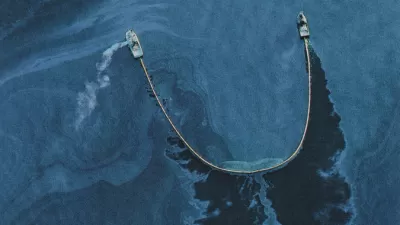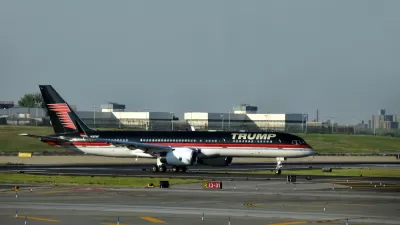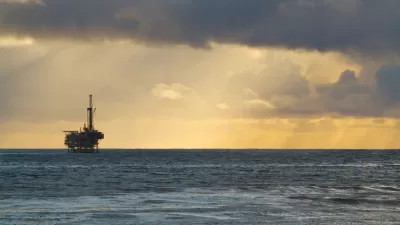Unlike Trump's suggested quarter-per-gallon gas tax, this 9-cents-per-barrel tax is real. Like the gas tax, it goes to a trust fund, to respond to oil spills rather than build and maintains roads. While small, it brings in $500 million annually.

GOP leaders had allowed the tax to expire on Dec. 31, prompting environmentalists to call it "another industry victory under President Trump at the expense of people and wildlife located near sites susceptible to [oil] spills," reported Juliet Eilperin and Dino Grandoni for The Washington Post on Jan. 5.
Eilperin and Grandoni called it "a move that amounts to another corporate break in the wake of lawmakers’ sweeping tax overhaul late last month."
The tax on companies selling oil in the United States generated an average of $500 million in federal revenue per year, according to the [Congressional Research Service (pdf)]. The money, collected through a 9 cents-per-barrel tax on domestic crude oil and imported crude oil and petroleum products, constituted the main source of revenue for the Oil Spill Liability Trust Fund [administered by the U.S. Coast Guard's National Pollution Funds Center].
Although GOP leaders opted not to renew the tax in December, they are considering reinstating it retroactively in an “extenders” bill that would revive several recently expired taxes.
Alaska's two U.S. senators, Lisa Murkowski, who chairs the Energy and Natural Resources Committee, and Dan Sullivan, both Republicans, did just that. They told Morning Energy that "the inclusion of a 9-cent-per-barrel tax on oil to pay for spill cleanups was not opposed by industry," reports POLITICO's Kelsey Tamborrino on Feb. 16.
"They recognize that this part of the cost of doing business,” Murkowski said. "I think they also want to make sure it’s not an increasing cost of doing business, but there is certainly an understanding about why it is in place and the importance of it.”
Sullivan agreed: "I’m as pro-resource development as anybody, but I think you have to have the proper balance and that fund is meant for cleanups and disasters if we have them.”
However, the Post's Eilperin and Grandoni had reported that the "American Petroleum Institute, the industry’s largest lobbying group, opposes renewal of the per-barrel tax," seemingly a change from their position expressed in May 2010, just weeks the infamous Deepwater Horizon – BP oil spill, responsible for almost 5 million barrels of oils that spilled into the Gulf of Mexico.
With President Trump's signature on the bipartisan budget deal that ended the brief governmental shutdown on Feb. 9, the oil tax will take effect March 1, but will expire on Dec. 31, reports Katelyn Caralle for the Washington Examiner on Feb. 9.
As for the small size of the tax, it can be contrasted with an oil tax proposed by former President Obama during his last year in office, a $10 per barrel oil tax to fund his 21st Century Clean Transportation System to reduce carbon emissions and promote new vehicle technology. It met the same fate that will likely befall Trump's 25-cents gas tax, according to Bloomberg News on Feb. 15.
Correspondent's note: Scroll down to "ALASKANS EXPLAIN OIL SPILL TAX REVIVAL" in source article for the segment on Oil Spill Liability Trust Fund.
FULL STORY: Harsh words prompt Pruitt flight concerns

Study: Maui’s Plan to Convert Vacation Rentals to Long-Term Housing Could Cause Nearly $1 Billion Economic Loss
The plan would reduce visitor accommodation by 25,% resulting in 1,900 jobs lost.

Alabama: Trump Terminates Settlements for Black Communities Harmed By Raw Sewage
Trump deemed the landmark civil rights agreement “illegal DEI and environmental justice policy.”

North Texas Transit Leaders Tout Benefits of TOD for Growing Region
At a summit focused on transit-oriented development, policymakers discussed how North Texas’ expanded light rail system can serve as a tool for economic growth.

Nevada Bills Aim to Establish Home Insurance Assurance Amidst Wildfire Risk
Republican sponsor hopes the FAIR plan would be “a true market of last resort.”

Virginia Law Allows Judges to Mandate Speed Limiters
The law could set a new precedent for speed limiting tech on U.S. vehicles.

Comment: EPA Cuts will Send Atlanta Back to Eye-burning Ozone, Lung-damaging Smog, and Raw Sewage in the Chattahoochee River
A veteran political journalist takes stock of the hard-earned ground Georgia stands to lose with slashed environmental protection.
Urban Design for Planners 1: Software Tools
This six-course series explores essential urban design concepts using open source software and equips planners with the tools they need to participate fully in the urban design process.
Planning for Universal Design
Learn the tools for implementing Universal Design in planning regulations.
City of Santa Clarita
Ascent Environmental
Institute for Housing and Urban Development Studies (IHS)
City of Grandview
Harvard GSD Executive Education
Toledo-Lucas County Plan Commissions
Salt Lake City
NYU Wagner Graduate School of Public Service





























